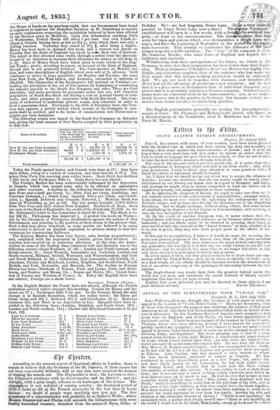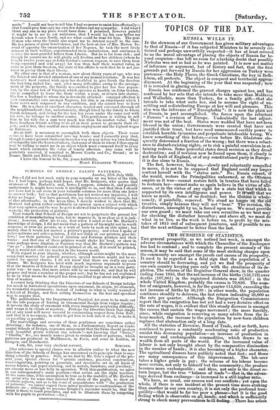APPEAL TO THE SYMPATHIZERS WITH "UNCLE TOM."
Newport, B. J., 13th July 1853.
Sin—Will you allow me through the columns of your paper to make an appeal to the readers of "Uncle Tom's Cabin " ? There are thousands, even of those who disapprove the purpose and challenge the fairness of that great American novel, who have had their sympathies called forth on behalf of the race it advocates. In the Southern States of America such sympathies find ready vent—in England, and at the North, we have fewer opportunities of legitimate action. I have been passing part of the summer in Clarke County, Virginia, where two cases affecting persons I have known for years have greatly excited my sympathy ; and I now venture to make my most earnest appeal to persons richer than myself, to assist me in the attempt to give them freedom, home, and happiness. The more pressing case is that of a man named John Gordon, a very light Mulatto, a blacksmith and paper-hanger by trade, whom I have known since 1542, and who bears the highest cha- racter amongst the gentlemen who employ him. He was born the slave of Mrs. Hawes, of Rappahannock County ; and was emancipated at her death, as by her will she set free all her Negroes and provided for their transport to Liberia. John Gordon, who had married a slave woman to whom he was mush attached, preferred to remain in Virginia. He has continued to reside there fifteen years as a free Negro; but, under tho new laws lately passed by the Convention, he has been called before the County Court, and warned that he must quit the State within two months, or return into slavery. It is easy calmly to read or state these facts; but it was not easy to listen to them calmly when the poor fellow in deep distress came up to speak to me. He had an idea that people iu free countries would pity his case,—that " Miss Lizzie, from England and the North," could do something to assist him in the purchase of his wife, and at least some of his eight children, so that they might leave the State together. Was there nothing I could do ? he asked—was there nothing he could do to prevent his being separated for over from his family, leaving his wife and children to the uncertain chances of slavery ? "There is not anything," he exclaimed with a pathos that deeply moved me—" there is not anything in the world I would not do for them, Miss Lizzie, except go back and be a slave again." I could not bear to tell him I had no power to assist him effectually— that I couldgive him only my own few dollars and my sympathy. I did what I think any one in my place would have done : I promised, however painful it might be to me to ask assistance, that I would lay his case before my !lieu& when I came North, and see what could be done for him. The gen- tleman who owns the family also urged me to interest myself in the case. He is a person of great benevolence, and the heir-at-law of Mrs. Hawes. In- stead of opposing the emancipation of her Negroes, ho took the most lively interest in their welfare, superintended their embarkation, and continues to receive the most grateful letters from Liberia. But he is far from rich ; and though he assures me he will gladly sell Evelina and her children (whom he }might twelve years ago at John Gordon's earnest request, to save them from being separated and sold away) for less than half their market value, in oriler to give them freedom, the state of his affairs is such that he is not jus- tified in giving them their liberty.
31 y other case is that of a woman, now about thirty years of age, who was the beloved and devoted attendant of one of my nearest relations. It was her mistress's most earnest wish upon her deathbed to give Sarah the freedom she bad long sighed for ; and, after many difficulties owing to the arrange- ment of the property, the family was enabled to give her her free papers : hut, by the same law of Virginia which operates so harshly on John Gordon, she is compelled to leave the State within a year, or return into slavery. She has a husband to whom she is devotedly attached : conjugal affection is (not unnaturally) rare amongst Negroes, but this is an attachment which I have never seen surpassed in any condition, and she cannot bear to leave him. He is a slave of excellent character, trusted and esteemed through all the neighbourhood ; but, unfortunately, though hired by the family to whom Sarah belonged, and living for the last ten years under the same roof with his wife, he belongs to another master. This gentleman is willing to sell Hint to his wife for a sum very much less than his market value. They have Southern friends willing to do all in their power to promote their ob- ject; and if free, they could at once obtain employment and the highest wages in Baltimore.
About 650/. is necessary to accomplish both these objects. Their cause seems to have been committed into my hands; and I earnestly pray that, though I cannot present their case in such a way as may infuse my own feelings of sympathy into the hearts of others, that some of those to whom I thus appeal may be willing to assist me in an object which must commend itself to every heart which estimates the value of family affection. Any sums will be gratefully received, if remitted to Messrs. Coutts and Co., Strand ; or to Messrs. Sinith and Elder, 65 email].
I have the honour to be, Sir, yours faithfully,
MART ELIZABETH WORMELEY.



























 Previous page
Previous page